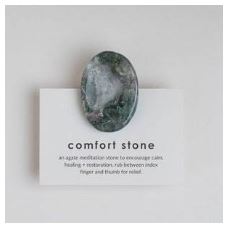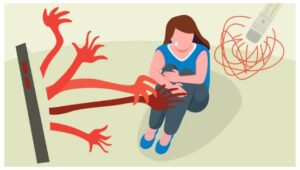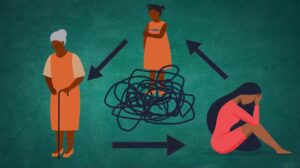The Weight You Carry When No One’s Watching
It creeps in quietly, like a shadow stretching long at the end of the day. The meetings are over, the emails have stopped, the office lights dim. You’re home, “off the clock.” But inside, it’s anything but quiet.
Your heart’s still racing, your thoughts still spinning. Even though the world outside your front door has wound down for the night, your body refuses to believe it’s safe. It’s as if the next disaster is lurking just beyond the horizon, and you’re bracing for it, minute by minute.
You might tell yourself,
“I just need a good night’s sleep.”
“It’s normal, everyone’s stressed these days.”
Or maybe, “Real men don’t break down.”
But here’s the thing. After years of sitting across from people in therapy rooms, of listening to stories that sound just like yours, I can tell you, this isn’t just stress. This is chronic anxiety, and it weaves its way into every part of your life: your relationships, your health, your dreams. It can make you forget who you were before the hyper-vigilance set in. Before surviving became your default.
Trust me, you don’t have to keep living like this.
A Real Story From the Trenches
It’s a post from a stranger on the internet, but it’s also a story I’ve heard a hundred times before.
r/askatherapist
Does chronic anxiety always have a cause?
I have a severe anxiety disorder. In therapy, my T is so focused on finding the why. Why do I have these upsetting thoughts? Why am I scared I’ll hurt people? But trying to dig into those reasons only makes me more anxious. After every session, I feel worse, like I’ve been picked apart and left raw. I’ve been anxious for as long as I can remember. I don’t think there’s a cause. I think I was just born this way. Coping strategies make more sense to me, even if they don’t solve everything. I’ve talked to my T, and they tell me to be patient. But I don’t know if I can keep paying to feel worse after every session. Any help would be appreciated. Thanks.
That post could have been written by anyone, maybe even you. It speaks to a truth that often gets overlooked: not everyone finds comfort in the “why.” For some, chronic anxiety isn’t rooted in a single trauma or event. It’s a way their nervous system has always been wired.
You don’t have to unearth every memory or find the perfect explanation to heal. Sometimes, it’s enough to just start where you are, right here, right now, and learn how to be with the weight you carry, until, slowly, it feels a little lighter.
Signs Chronic Anxiety Is Impacting More Than Just Your Job
- Trouble enjoying downtime, always feeling “on edge”
- Difficulty connecting emotionally with your partner or kids
- Loss of interest in hobbies, passions, or friendships
- Health issues like headaches, digestive problems, high blood pressure
- Snapping at loved ones over small things, then drowning in guilt
- Constant second-guessing of every decision, big or small
- Feeling empty even after achievements or “good news”
- Pulling away from people because it feels “easier”
Take a moment to think if any of these sound familiar. You are carrying a burden that your nervous system was never designed to handle on its own; It does not mean that you are “failing at life.”
Busting the Myth: “Strong Men Just Push Through It”
It is not strength to clench your teeth while your soul silently deteriorates. That’s automatic survival.
Asking yourself, “Is this really the life I want to live?” is a sign of true strength. It’s the realization that the armor you’ve been wearing on a daily basis—the mask that tells you that you’re okay even though you’re breaking inside—has grown too heavy for you to bear.
It’s about allowing yourself to take a break from fighting, even for a short while. to acknowledge that you’re a mess, scared, and hurting human being and that you don’t have to keep everything together by yourself.
Believing that you deserve more than merely surviving is what it means to be strong. It’s determining that you deserve to feel secure, comfortable, and reunited. And that perhaps asking for assistance on
Inner Dialogues That Trap Men in Silent Anxiety
“I can’t afford to fall apart.”
“I should be able to handle this.”
“If I say I’m struggling, they’ll think I’m weak.”
“Other people have it worse. I have no right to complain.”
They infiltrate your mind, whispering as though they are facts rather than emotions. Additionally, they become heavier the longer they stay, until you feel as though you are bearing the weight of the entire world on your chest.
The fact is, though, that your way of thinking does not make you broken. Failure is not indicated by these thoughts. They are an indication that you have been struggling to survive for too long in a world that doesn’t always make room for your suffering.
You’re worthy of better. You are deserving of some breathing room. You should be able to breathe deeply, let go of the burden, and realize that you are not alone in carrying it.
How Chronic Anxiety Quietly Changes Your Life
Relationships Erode
Even when you believe you’re holding it together, your loved ones are feeling it too.
It manifests as the tension in your shoulders when your significant other poses a straightforward query. The half-listening when your kids tell you about their day, and the quiet guilt that follows.
Not that you don’t give a damn. It’s because you’re exhausted. It feels like you have nothing left to give when anxiety takes over.
Dreams Shrink
Your loved ones are feeling it too, even if you think you’re holding it together.
It shows up as the harshness of your tone and the stiffness in your shoulders when your partner asks a simple question. The silent guilt that comes after your children tell you about their day and the half-listening that occurs.
It’s not that you don’t care. It’s because you’re worn out. When anxiety takes over, you feel as though you have nothing left to offer.
Your Body Pays the Price
Whether you know it or not, your body keeps the score.
Anxiety permeates your bones, muscles, and digestive system in addition to remaining in your head. The churning in your stomach, the headaches that won’t go away, the tightness in your chest, and the nights when you can’t sleep aren’t all random. Your body uses them to tell you, “Enough.”
Our bodies suffer when we suppress our anxieties and fears, telling ourselves to “get over it.” The tension gradually increases, sometimes manifesting as migraines and other times as that persistent back or neck pain. Even when nothing is wrong, you may feel too tired to get out of bed or notice that your heart is racing.
Untreated anxiety frequently manifests as:
- Migraines
- Tension in the muscles
- digestive problems
- Sleeplessness
- Stress on the heart
You are not being deceived by your body. It’s attempting to capture your interest. “Please stop,” it says. Listen, please.
Ignoring anxiety doesn’t make it go away; it only makes it worse until your body has to shout what your mind is trying so hard to keep quiet.
Self-Trust Crumbles
Chronic anxiety causes one to question their intuition, fortitude, and value.
You lose faith in yourself.
You question your choices, your relationships, and even your capacity to function in society.
Nothing can feel more devastating than the silent deterioration of inner trust.
How to Begin Reclaiming Your Life from Anxiety
Start a “Permission to Rest” Journal
Write down one instance where you overpushed yourself each night.
One minor thing you gave yourself permission to enjoy, even for just 30 seconds, is something you can forgive yourself for.
Little deeds of kindness toward yourself are the first steps toward restoring self-confidence.
Create an “Anxiety Anchor”
Keep a small item in your pocket, such as a coin, a key, or a smooth stone.
Keep your composure and remind yourself that I have made it through all of my worst days. I am also capable of surviving this moment.
Set a “Sanctuary Hour”
One hour every week. No output. Nothing needs to be fixed.
Just you, your breath, your favorite drink, and your favorite music.
It is an act of self-love and survival to establish a haven amidst the chaos.
Building Bridges to Healing: Why Therapy Matters
You are not broken if you seek therapy.
It simply means you’re choosing to stop stumbling through life alone.
Therapists at Coach For Mind offer spaces where:
- Anger is respected.
- Grief is witnessed.
- Hope is gently and gradually restored.
Because healing doesn’t mean erasing your anxiety, it means learning to live alongside it with agency and self-trust.
As one Reddit user vulnerably shared:
“I’m about 90% recovered from my anxiety/panic problems. Although you can’t completely get rid of the anxiety, you learn to control where it goes.”
That’s what therapy can offer, not instant relief, but tools, understanding, and a sense of direction.
A way to say:
“I may not have chosen this struggle, but I choose how I respond to it.”
You deserve a life where peace isn’t a reward for pain, but a birthright.
You deserve a life that is truly yours again.
FAQ: Chronic Anxiety and Reclaiming Your Life
Can chronic anxiety affect relationships?
Of course. Anxiety frequently makes it more difficult to connect emotionally. Even with those you love very much, it can result in emotional shutdown, irritability, or withdrawal. Resolving your anxiety also helps to mend your relationships
Why do I feel empty even when good things happen?
Your nervous system remains in survival mode if you suffer from chronic anxiety. It numbs your sense of fulfillment, pride, and joy. In order to feel alive again, therapy helps to thaw those emotional circuits.
Is it normal for anxiety to cause physical symptoms?
Indeed. Stress hormones produced by anxiety overwhelm the body and eventually result in very real symptoms like headaches, stomach problems, and muscle soreness. Resolving anxiety also entails resolving physical issues.
Should men seek therapy for chronic anxiety?
The strongest men do, indeed. Talking nonstop isn’t the point of therapy. It’s about taking back your freedom, your tranquility, and your breath.
How can therapy at Coach For Mind help with chronic anxiety?
You are not treated like a diagnosis by Coach For Mind therapists. They see you as a person who has carried too much for too long. They provide useful tools, emotional support, and the unwavering conviction that you are sufficient.
There is still more to your story.
You do have hope. By struggling, you are not failing; rather, you are fighting for your life, and it is still worthwhile to live it fully, courageously, and deeply.
Ready to take the next step toward healing? Visit www.coachformind.com.
Why Coach For Mind?
- We are an organization focused on therapy that is informed by trauma and rooted in compassion. Our psychologists, who are licensed and RCI-registered, excel in approaches like EMDR, IFS, CBT, DBT, Psychodynamics, and others. However, techniques are never the final goal.
- We emphasize on creating a safe, judgment-free space where you can heal on your own terms.
- We recognize that every journey is individual. This is why we avoid one-size-fits-all solutions. We listen, we tailor our approach, and we accompany you, regardless of your challenge, whether it’s anxiety, past traumas, or feelings of being stuck.
- Quality Service is the first and foremost priority at Coach For Mind.
- Coach For Mind places your emotional safety at the forefront. Our kind, structured, and professional trauma-informed approach guarantees that you will consistently feel supported but never pressured. You don’t need to get everything right. You don’t need to be okay. Just be yourself and we will collectively figure a way out.











